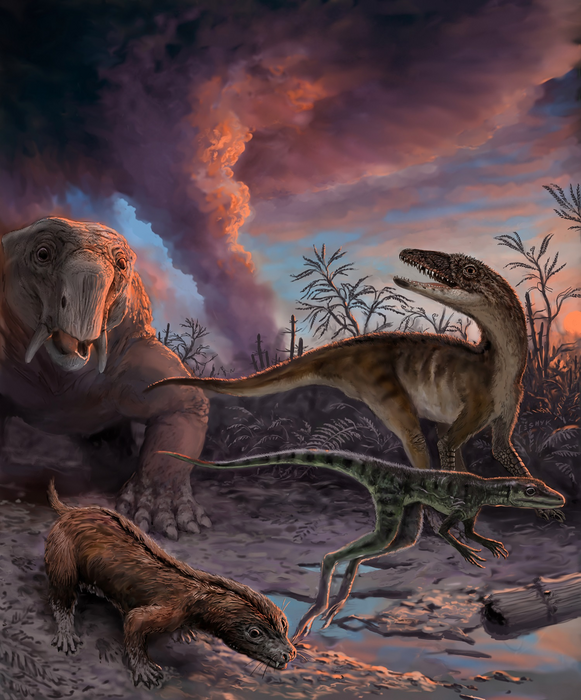Climate change, rather than competition, played a key role in the ascendancy of dinosaurs through the Late Triassic and Early Jurassic periods.

Credit: Victor O. Leshyk, www.paleovista.com
Climate change, rather than competition, played a key role in the ascendancy of dinosaurs through the Late Triassic and Early Jurassic periods.
According to new research, changes in global climate associated with the Triassic-Jurassic mass extinction – which wiped out many large terrestrial vertebrates such as the giant armadillo-like aetosaurs – actually benefitted the earliest dinosaurs.
In particular, sauropod-like dinosaurs, which became the giant herbivore species of the later Jurassic like Diplodocus and Brachiosaurus, were able to thrive and expand across new territories as the planet warmed up after the extinction event, 201 million years ago.
The new evidence is published in Current Biology, by an international team of palaeontologists led by the Universities of Birmingham and Bristol, in the UK, Friedrich-Alexander University Erlangen-Nürnberg (FAU), in Germany, and the University of São Paulo in Brazil.
The team compared computer models of prehistoric global climate conditions such as temperature and rainfall with data on the different locations of dinosaurs taken from sources such as the Paleobiology Database. They showed how the sauropods, and sauropod-like animals, with their long tails and necks and small heads, were the runaway success story of a turbulent period of evolution.
Dr Emma Dunne, now a lecturer in palaeontology at FAU, carried out the research while at the University of Birmingham. She said: “What we see in the data suggests that instead of dinosaurs being outcompeted by other large vertebrates, it was variations in climate conditions that were restricting their diversity. But once these conditions changed across the Triassic-Jurassic boundary, they were able to flourish.
“The results were somewhat surprising, because it turns out that sauropods were really fussy from the get-go: later in their evolution they continue to stay in warmer areas and avoid polar regions.”
Co-author on the paper, Professor Richard Butler, at the University of Birmingham, said: “Climate change appears to have been really important in driving the evolution of early dinosaurs. What we want to do next is use the same techniques to understand the role of climate in the next 120 million years of the dinosaur story”.
The research was funded by the Leverhulme Trust and the European Research Council.
Journal
Current Biology
DOI
10.1016/j.cub.2022.11.064
Method of Research
Data/statistical analysis
Subject of Research
Not applicable
Article Title
Climatic controls on the ecological ascendancy of dinosaurs
Article Publication Date
16-Dec-2022




